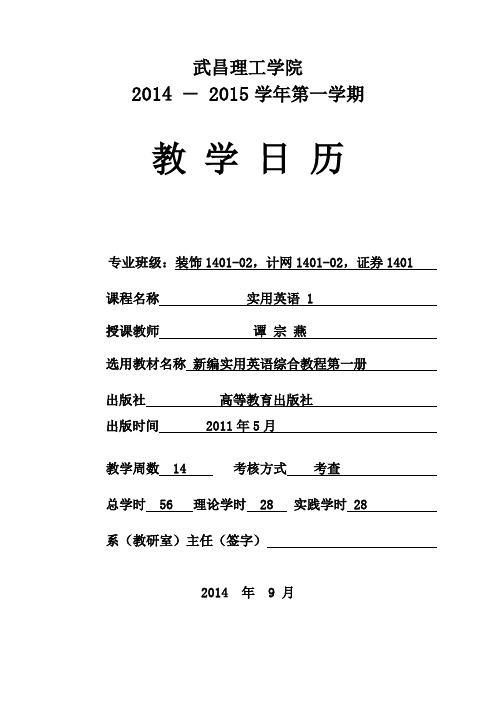英语写作基础1教学日历(美方单学位)荣秀丽
- 格式:docx
- 大小:43.54 KB
- 文档页数:5




武昌理工学院
2014-2015学年第一学期
教学日历
专业班级:装饰1401-02,计网1401-02,证券1401 课程名称实用英语 1
授课教师谭宗燕
选用教材名称新编实用英语综合教程第一册
出版社高等教育出版社
出版时间 2011年5月
教学周数 14 考核方式考查
总学时 56 理论学时 28 实践学时 28 系(教研室)主任(签字)
2014 年 9 月
说明
1、此表一式三份,教务处、教师所在学院各一份,本人留存一份。
2、原则上以课堂为单位(即每2学时为一课堂/次)逐项认真填写。
在上课后第二周内交与教师所在学院的系(教研室)主任审查、签字,于第三周交教务处。
3、教学方式含理论讲授和实践(训)。
实践(训)含实验、课堂讨论、训练课(习题课)等。
4、总学时为双数。
总学时数等于理论学时数与实践学时数之和。
5、因节假日全校活动等影响教学进度,可排2-4学时机动。


大连科技学院
教学日历
2012 ~2013 学年第一学期
教学单位外语系
课程名称英语写作Ⅰ
课程编号 010523 学时 32 学分 2 适用专业英语专业年级 10级
授课教师张琳娜职称讲师
大连科技学院教务处制
编写说明
1、教学日历为教师教学基本文件之一。
授课教师应按照本课程教
学大纲、教案认真编写。
2、一式四份和电子文档一份,于每学期开学(开课)第一周送交
教务部、所在教研室、授课教师各存一份。
3、教学日历要求按统一格式(可附页填写),打印成册。
4、教学日历要长期保存备查。
授课教师:张琳娜教研室主任:系主任(分院长):。
高中英语基础写作教案Section 1: Writing FormatTeaching Objectives:Students will be able to have a basic knowledge of proper writing format.Teaching Key Points:Word division, capitalization and punctuationTeaching Duration: Two periodsTeaching Steps:Step 1: Arrangement1. Rules of leaving margins2. Rules of writing the title3. Rules of paragraphingStep 2: Word division12 rules of word divisionStep 3: Capitalization1. Basic rules2. Special usage of capital letters and punctuation in quoted words and sentences Step 4: PunctuationFull stop “.”; comma “,”, colon “:”, semicolon“;”, exclamation “!”, question mark “?”, hyphen”-”, dash“----”Step 5: The importance of punctuationChoices in punctuation can greatly affect meaning.Example:dear john I want a man who knows what love is all about you are generous kind thoughtful people who are not like you admit to being useless and inferior you have ruined me for other men I yearn for you I have no feelings whatsoever when were apart I can be forever happy will you let me be yours GloriaStep 6: ExercisesPut the correct punctuation marks in the spaces underlined in the following paragraphs. Also add CAPITAL LETTERS where necessary1. married people live__ happily ever after__ in fairy tales__ but they do so less and less often in real life __I__ like many of my friends__ got married__ divorced__ and remarried__ I suppose__ to some people__ I__ m a failure__ after all__ I broke my first solemn promise to __love and cherish until death us do part__ but I feel that I m finally a success__ I learned from the mistakes I made in my first marriage__ this time around__ the ways my husband and I share our free time__ make decisions__ and deal with problems are very different__2. the first of the great civic universities established in england__ manchester is today the largest unitary university in the united kingdom and an internationally famous center of learning and research__ it is well __endowed with resources and facilities__ the university library__ for instance__ is one of the four big academic libraries in the country__ and the university has its own modern theatre __television studio__ art gallery__ museum__ shopping centre and __of course __extensive sports facilities__ Put the correct punctuation marks in the following passages. Also add CAPITAL LETTERS where necessary1. mr brown had been teaching english abroad for a number of years he had forgotten how cold it could be in england in the winter it was often dull and grey in november but it could be really cold in december january and february even in the spring it could snow mr brown looked out of the window as the train crossed the river avon heremembered the weather forecast that he had heard on the bbc at 9 oclock that Tuesday morning it said that it would be wet and windy in the north west manchester where he was now travelling to was unfortunately in the northwest2. let me just say again that i think that investing in the space program is also an investment in the people i think that the long range benefits of the space program can drastically change life on this earth for everyone i think that mankind has the chance to move ahead to make real progress toward a better life and that this will happen as a result of scientific achievements in space I think we invest more in our existing social programs we will be thinking only about today and forgetting tomorrow we will not be moving forwardSection 2: Usage of wordsTeaching Objectives:Students will be able to have a basic knowledge of choosing and using words properly.Teaching Key Points:Choice and use of wordsTeaching Duration: One periodTeaching Steps:Step 1: Principles: appropriate; exact; idiomatic; interestingStep 2: Being appropriateWriting styles: formal, common, colloquialThe levels of words: formal (learned or big words), common (daily used), colloquial (informal familiar conversation)Step 3: Being exactTry to use specific words and pay attention to connotative General——professional ----- scientist ------ chemist -------biochemist——specific Example:Country: refers to an area of land and its population and government.Nation: emphasizes the people of a country.State: refers to the government or political organization of a country.Land: is less precise but more literary and emotive.Step 4: Being idiomaticTry to use idioms. Idioms are fixed groups of words with a special meaning which is different from the meanings of the words that form it. All the phrasal verbs, set expressions, pairs of words and sayings.Step 5: Being interestingThere are various ways of using words figuratively. They are called figures of speech or rhetorical devices. Such use makes the expression more interesting and vivid. Step 6: Dictionary1. How to use a dictionary2. Useful dictionariesSection 3: SentencesTeaching Objectives:1. Students will be able to write correct sentences.2. Students will be able to write sentences of different patterns with same meanings. Teaching Key Points:How to write correct sentencesTeaching Duration: Five periodsTeaching Steps:Step 1: The introduction of sentencesCorrect sentence: grammatical concept, that is, the sentence should be correct in grammar.Effective sentence: refers to the fact that a sentence can achieve the goal of communication.How to achieve effective sentences?1. Unity“All roads lead to Rome.” ---“All words lead to a single thought.”2. CoherenceTry to avoid faulty parallel constructions/prons with ambiguous references/ dangling or misplaced modifiers/ confusing shifts in person and number or in voice, tense and mood.3. ConcisenessAvoid being wordy.4. EmphasisEmphatic sentences should be used.5. VarietyMix the long and short sentences, simple and compound complex sentences as well as try to use some rhetorical sentences.The purpose of seeking sentence variety is to avoid monotony in one’s speech or writing so as to achieve the most satisfactory result in communication.Step 2: Coordinate sentences1. What are coordinate sentences?Examples:We must make great efforts to catch up, or we will lag behind the others forever. Honey is sweet, but the bee stings.2. Conjunctionsand, as well as, both…and, not only… but also, neither, norbut, however, whereas, while, yet, still, instead, nevertheless, notwithstanding, on the other hand, not… but, rather than, in contrast, on the contraryor, nor, or else, otherwise, either…orbesides, also even, moreover, likewise, furthermore, what’s more, in additionfor, thus, so, therefore, hence, consequently, accordingly, as a resultthen, meanwhile, subsequently, afterward, laterthat is ( to say ), in other words3. ExercisesCombine each group of the following sentences by using such connecting words as and, but, yet, for, so, or, nor, to make them into compound sentences.1. Mr. Smith has stayed in London for five years.He knows the city quite well. (so)2. The old man stood on the street.He didn’t know which way to go. (for)3. The two sides were asked to settle the dispute by themselves.Soon they reached an agreement. (and)4. Jimmy fell off his bike.He was unhurt. (but)5. Let’s hurry up.We will be late. (or)6. I like classical music.My sister likes popular music. (yet)7. We may stay here for another few days.We may go right now. (or)8. The boss is flying to New York.His secretary will be responsible for daily affairs. (so)9. We fished all day long.We did not catch a thing. (yet)10. Mr. Fisher does not love the food.He is not accustomed to the climate, either. (nor)Step 3: Complex sentences1. Adverbial clausesExamples: Hardly had I opened the door when the telephone rang.He had to put on his coat because the wind was blowing harder and harder.He talked clearly so that he could leave a good impression upon theinterviewer.He is doing the job as he was asked to.Even if he was over seventy years of age, he insisted on reading regularly.The story was so interesting that the children would like it to be told againand again.A host does not show his guests around the house unless there is a specialreason for doing so.2. Attributive clausesExamples: They have been invited to visit their country, which is very kind of them.The headmaster, with whom the parents had discussed their son’s future,advised the boy to take up engineering.Let’s think of a situation where this idiom can be used.3. Noun clausesExamples: We demanded a guarantee that no similar incident would take place again.I hope that we could talk about the problem in the next few days.That he will come and help you is certain.This is how Henry solved the problem.5. Exercises.Translate the following sentences into English using complex sentences.1. 我正在街上走着,这时忽然有人从后面拍我的肩膀。